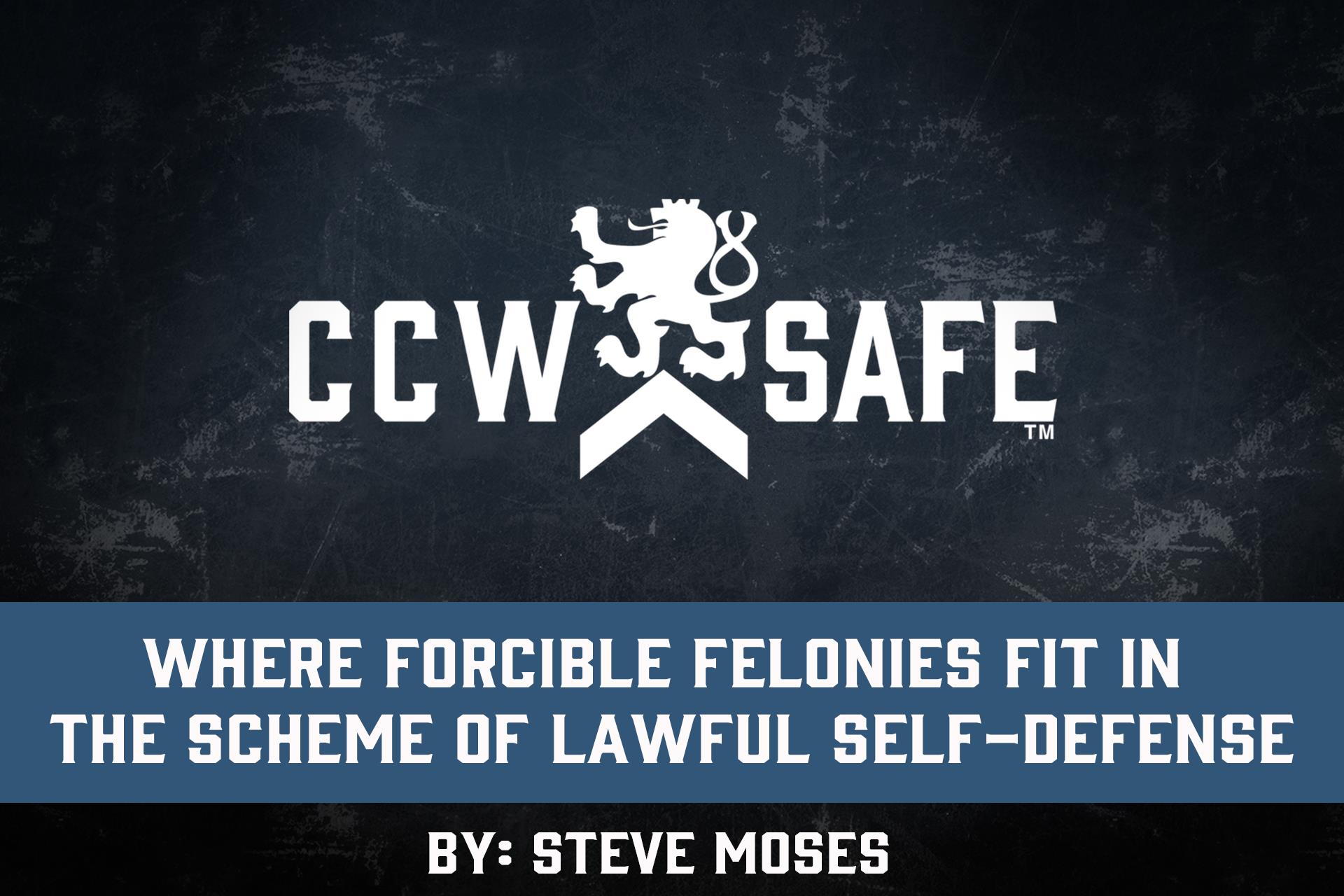
Posted on October 12, 2020
WHERE FORCIBLE FELONIES FIT IN THE SCHEME OF LAWFUL SELF-DEFENSE
WHERE FORCIBLE FELONIES FIT IN THE SCHEME OF LAWFUL SELF-DEFENSE
It is commonly accepted that in most places a concealed carrier may use deadly force in order to defend him or herself or even a third person against another person or persons if the same has the opportunity, the ability, and the immediate intent to cause serious bodily injury or death. In some states, the presence of castle doctrine and “stand your ground” laws may not require the concealed carrier to first attempt to disengage or retreat, but regardless as to whether these laws are in force it is always best to withdraw if the same is an option simply because no person in their right mind wants to increase the chances that may be charged by an over-zealous prosecutor. However, there are some crimes that fall into a special category in which an apparent intent to maim or kill is not necessarily an element, and those crimes are referred to as forcible felonies. The actual commission of the forcible felony is in some ways a substitute for criminal intent since the threat of violence is contained within the event.
Concealed carriers in all 50 states have the right to use force, up to and including deadly force, if they are facing an imminent threat of great bodily harm or death. However, something that is not often discussed is that in most jurisdictions concealed carriers also have the right to use force, up to and including deadly force, to prevent the commission of certain violent crimes against concealed carriers or others. Typically, these crimes are serious, violent felonies and are usually specifically listed in state statutes, often (but not necessarily) under the category of “forcible felonies”.
Crimes like sexual assault, armed robbery, and murder are consistently included, but concealed carriers will also see crimes like kidnapping, arson, burglary of a dwelling, aggravated assault, aggravated battery, placing an explosive device, and even aircraft piracy on some lists. Concealed carriers should make certain that they know the laws in their state regarding which crimes are included in the list. They cannot use deadly force to prevent just any felony crime, however, only the ones that are listed in the statute or otherwise acknowledged by the courts. For example, concealed carriers cannot use deadly force to prevent auto theft, bank fraud, and drug deals. Even though these are felony crimes they would not be the type that a legislature would consider as serious and dangerous enough to allow a concealed carrier to use lethal force to prevent. Using deadly force to prevent the commission of such felonies would almost certainly result in serious criminal charges.
Most of the qualifying crimes include some degree of violence directed at the victim, often even life-threatening force, even though that crime can be committed without employing a degree of violence that would likely cause great bodily harm or death. In some instances, the crime can be committed without actual physical violence at all.
If a concealed carrier is the victim of a forcible felony in which his or her state allows lethal force to prevent, instead of the focus being on whether the threat of harm the concealed carrier is facing is an imminent threat of great bodily harm or death, the focus instead is on whether they are facing the imminent commission of the forcible felony. In other words, under these statutes, concealed carriers could use deadly force to prevent an armed robbery, a sexual assault, or other enumerated crime without having to first determine if the specific force being used by the criminal to commit the crime was sufficient to create an actual imminent threat of great bodily harm or death.
To be blunt, if someone is trying to rape the concealed carrier, they don’t have to try and figure out if the rapist intends to seriously hurt or kill them during the rape (or use some lesser amount of force to subdue them) before they can use deadly force in order to prevent the rape from being accomplished. In this instance the right to use deadly force is available to prevent the commission of the crime itself, not only in direct response to the specific degree of force being used to commit the crime.
In Texas, a person is justified in using deadly force against another person in order to protect him or herself against the other’s actual use or attempted of use of deadly force or to prevent the other’s imminent commission of aggravated kidnapping, murder, sexual assault, aggravated sexual assault, robbery, aggravated robbery, and arson, as well as several other criminal offenses under certain conditions. However, it is vitally important for concealed carriers and armed homeowners to know and avoid all of the actions that could render the concealed carrier’s use of force or deadly force unlawful, such as provoking the person whom the force was used against or the concealed carrier being currently engaged in certain criminal activities.
As always, the use of deadly force should be the last resort. Using deadly force to prevent the commission of a forcible felony when a lesser degree of force would have very likely been just as effective should be avoided, and a failure to do so may very well result in the defender being prosecuted and perhaps even convicted of a serious crime. Ideally, in the event of a forcible felony, a concealed carrier should be able to identify what is taking place, understand what responses are legally permitted and what responses are not, and possess the physical skills, appropriate defensive tools, and knowledge to successfully deal with the threat and not get caught up in a terrible legal situation later.
 |
Steve MosesSteve Moses has been a defensive firearms trainer for over 26 years and is a licensed Texas Personal Protection Officer with 7 years of experience performing as shift lead on a church security detail for a D/FW area metro-church. Steve is a co-owner and Director of Training for Palisade Training Group, LLC based in Dallas, Texas. Moses is a retired deputy constable and spent over 10 years on a multi-precinct Special Response Team. He owns multiple instructor certifications, including Rangemaster Advanced Handgun Instructor and Defensive Shotgun Instructor, Red Zone Knife Defense Instructor and Adaptive Striking Foundations Instructor, Modern Samurai Project Red Dot Sight Instructor, and State of Texas Personal Protection Officer Instructor. Steve holds a BJJ Brown Belt in Relson Gracie Jiu Jitsu. He is a content contributor for CCW Safe and writes weekly articles on various subjects of interest to concealed carriers. Moses shoots competitively and holds an IDPA Expert rating. Steve is an annual presenter at the Rangemaster Tactical Conference. |